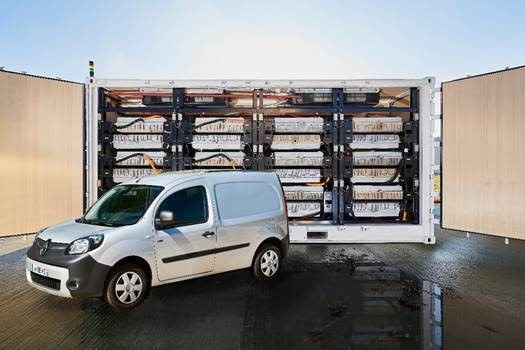Mobilize Power Solutions, the electric vehicle (EV) charging specialist of Renault Group, has partnered with Connected Energy to install second-life battery energy storage systems (BESS) at EV sites.
The partnership aims to support EV charging locations that lack appropriate energy supply with the necessary infrastructure to store energy required for charging. This will cater with the growing demand for EVs on the UK’s roads by presenting enough capacity to install additional chargepoints.
This anticipated growth in EV adoption will rise in the coming years with Centrica’s Hive having revealed 54% of UK drivers want to switch to an EV within the next five years ahead of the internal combustion engine (ICE) production ban from 2030.
Connected also presents a unique method in delivering this required energy capacity for the growing EV market. The company aims to scale-up its services in response to the growing energy storage market and increase international availability of second life batteries.
Matthew Lumsden, CEO of Connected Energy, previously explained that when EV batteries are around 25% degraded they are often considered unsuited to life in a vehicle, however they still have sufficient capacity for up to ten years’ more use in a battery energy storage system.
With this, the company utilises Renault EV batteries that are past that degradation point to create BESS units for energy projects. All of its current systems in operation across the UK and Europe are made from second life Renault vehicle batteries. This new partnership builds on a relationship with Renault aiming to support energy reliability.
“Connected Energy has been collaborating with Renault for six years on second life battery energy storage technology and our system is a fundamental part of harnessing the circular economy to provide industrial-scale energy storage. This partnership builds on this relationship,” Lumsden said.
“There is increased awareness of global supply chain issues and electricity grid supply challenges and this partnership addresses both of these in one solution.”
By partnering with Mobilize Power Solutions, Connected Energy gains a partner who is able to optimise its BESS systems for EV charging. Mobilize Power Solutions’ technology is able to track the grid load in real time and manage the battery response to overcome any grid constraints caused by peak loads such as EV charging.
“This partnership makes it possible for many more sites to adopt an EV charging station at remote and challenging environments as well as workplace and transport hubs. Our collaboration truly depicts the value of a circular economy and helps meet carbon neutral targets,” said Mark Dickens, managing director of Mobilize Power Solutions.
Implementing BESS systems could be huge for the EV charging market. The companies said that in some areas, integrating a battery on site can be much less costly than a power upgrade and, in some areas, it is “impossible” to bring in additional cabling and electricity.
This solution has also been successfully trialled in Germany and Belgium where two Connected Energy storage units had been placed on either side of a motorway balancing the grid between the EV chargers.
The BESS systems also allow drivers to have a steady flow of energy for when they need to charge an EV whilst also being able to use renewable energy, further decarbonising the transportation sector.
In July 2022, Connected Energy received £15 million from five new major investors, with the company having stated it will scale up its technology and operations.
Financing had been secured from Caterpillar Venture Capital Inc., the Hinduja Group, Mercuria, OurCrowd and Volvo Energy. They joined existing investors Engie New Ventures, Macquarie and the Low Carbon Innovation Fund.
Connected Energy also installed the first of its next generation of second life BESS systems as part of a Suffolk County Council project. The projected implemented a 300kW/360kWh E-STOR storage system at a flagship heritage facility – dubbed The Hold – on the University of Suffolk’s Ipswich Campus.
The system contained 24 second life Renault Kangoo batteries, with Renault and ABB having collaborated to increase the power and capacity efficiencies of the system.
Current±’s publisher Solar Media is running the EV World Congress on 5 and 6 October at the Leonardo Royal Hotel Tower Bridge. To find out more and get your ticket, see here.





